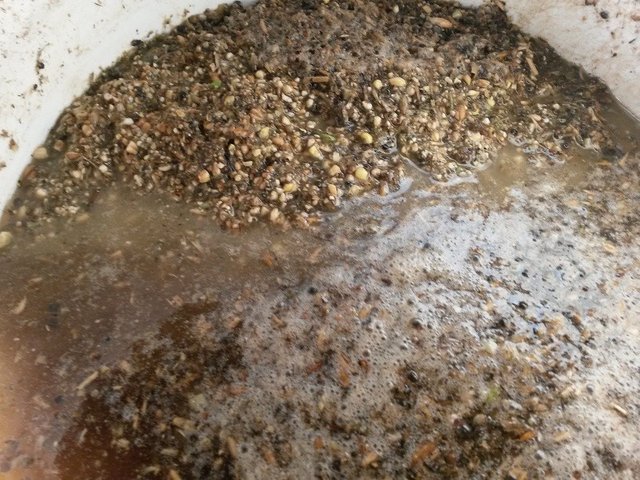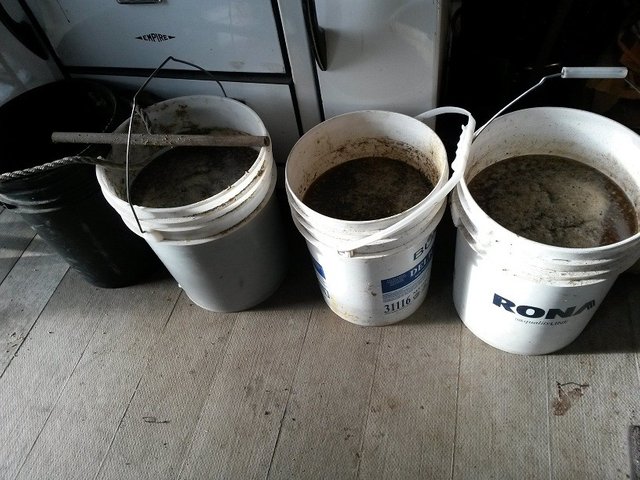Fermentation of chicken feed to save costs and improve uptake of nutrients for the birds
Last winter I played around with the idea of fermenting the feed for our chickens. We found that the chickens ate 25% less feed and increased in egg production as a result of the experiment. This is significant as feed costs continue to go up and living off grid means cash flow is tight. So how did we do it?
We filled the pails about 3/4 full of feed and then topped them up with water. We feed wheat, oats, barley and alfalfa in the past. We are now trying to augment that with peas and vitamins this time round to see if they do any better. None of the grain has been sprayed or desiccated. The alfalfa really helps darken the yolk of the egg as well as it is loaded with vitamins and minerals.
We keep the pails near the stove to keep them warm and to help the bacteria start the fermentation process. We seeded the pails with mesophilic culture which we would normally use for making cheese. We stirred in the culture to make sure it penetrated deep into the pail.
The feed absorbs water, so we also watch to make sure there is plenty of water for the process. After two days, the feed is ready and you can smell the feed fermenting. I then take a bit of feed and set it aside to then use as a starter for the next batch. I have two sets of pails so that each day I always have a batch ready to feed the chickens. When I return with the pail, I then fill it with feed, water and the starter that I set aside so that the culture can then work on the new batch. That way I don't have to keep using my cheese culture. I can keep a culture going for months if I am careful.
I try not to let the pails sit for any thing longer than a few days as mold will start to grow on the top of the pail. Although it is a bit more work, I think it is important that we utilize the resources the best way we can and I also find the birds are healthier, happier and more productive as a result. Chickens are omnivors and as such, they will eat meat, fermented food and all kinds of bugs, grass, grains, critters and what ever else they can find. They will clean up a carcass right to the bone and I've even tried growing maggots for them to eat.
That was an interesting experiment. I had a friend who picked up a road killed coyote, so I put it into a pail with holes big enough for flies to get into. The flies then laid their eggs on the carcass and when the maggots were ready to pupate after feasting on the carcass, they would leave the carcass, wiggle through the holes and drop to the ground where the chickens would then eat them up. There was a lot of 'juice' dripping from the pail too and the chickens loved that as well. I ended the experiment as it grossed out my wife and it did stink a bit. But it was fantastic protein for the birds and they did very well on the feed. If the corporate system failed, I would do it again without hesitation.
I heard many stories about old timers throwing a dead carcass into their chicken coops to help the birds through the winter. So it may seem gross to us, but the birds do what Creator created them to do. They clean up after the four legged. I heard stories of chickens cleaning a deer leg down to the bone. So if we slaughter a goat, I don't hesitate to feed the entrails or scraps to the chickens as well.


Wow! That's hard-core on the maggots experiement! But yes utilizing all the natural ways of achieving food production is great. I love hearing all you do on your farm/homestead. Awesome. Fermentation is such a great idea and its a good testament to the health of your hens that they were able to adapt to the fermented food so easily. Very cool idea.
We bought our feed for a long time. We finally found a neighbour who makes a feed mix of wheat, oats, barley, alfalfa and hemp. We will try it out. I would rather support my neighbour than a multi-national corporation who bought up all the feed mills in the area. I pay a bit more, but it is worth it in my view. The industrial feed mill never could offer organic, non-gmo products. So good for you for finding something like that. Cherish it as it is rare to find.
I sure know it. I had to look long and far to find this product and I am sooooo thankful for it. Are your neighbor's grains non-gmo? I agree 100% on supporting local, especially people who's names and faces you know! May your chickens thrive!
Yes, non-gmo. <3
Have you considered growing your own feed? How many pounds of feed do you go through a year? I'm just wondering if it's a practical endeavor. You would get bedding and feed for the chickens with the grain/seed and straw.
I don't have the space as most of the land we steward is bush. However, during the summer they run around and feed themselves with what ever they can find. Grass, bugs, mice, etc. Winter is the tough part. So we trade with neighbours the best we can.
I had a similar situation when I kept chickens. Most of my land is forested. During the summer we didn't need to buy feed, but winter came and they seemed to eat more than we did! They also needed all those extra calories to keep warm.
I think I'm with your wife on the dead coyote. But fermenting the feed is a new idea for me. The cost of chicken feed here is high, even if you mix it yourself. Perhaps it's time I do a little more research. My chickens also like duck weed and peanut plants.
I would not hesitate to do it again. I take care of the birds now and it makes a fantastic protein source for the birds. All that is left is hair and bone by the time the process is done.
Wow!! Great job!! I love how you are setting aside some of the ferment to create your own starter :) Genius. And how lovely that your gals are enjoying non gmo, spray free feed.
The coyote experiment sounds incredible, though I don't blame you for ceasing it lol...it would be quite stinky for a winter hobby...
Oh, it wont work in the winter because the flies are dormant. It is only a spring, summer and fall activity. In the winter, the birds could eat right off the carcass themselves if necessary.
Ahhhh gotchya!
It's very interesting chickens eat 25% less feed after they consume enough nutrients they need. People will eat less too if they eat food with more nutrients than chemicals in it.
Did the grains germinate a little? If so, more vitamins in the sprouts!
I like how you used road kills! It's imitating the Nature food cycle which never wastes. We fed our chickens and ducks with black soldier fly maggots, feeding on any organic kitchen scraps.
The grains were milled already. Although, we also experimented with sprouting wheat and barley for chicken fodder as well. It worked really well too. We sprouted the grain in our greenhouse for the birds. But it was a lot of work as we had to keep the greenhouse fire going to sprout the volume of grain we needed for the birds. So we abandoned the idea. But if push came to shove, it would work well too! I did not make any calculations, but I suspect sprouted grain would result in even more feed savings, but it is also a lot more work too.
When I was a kid it was my job to feed the pigs we raised. To do that my father had me mix up buckets of feed with water the day before so they could ferment. I thought it was a stinking mess at the ripe age of 12 but today I think it was genius.
Of course down here a day in the hot sun is enough to ripen most things ;-)
I love your sense to experiment and I bet the chickens loved the food, especially if there were any sugars that converted to ethanol.